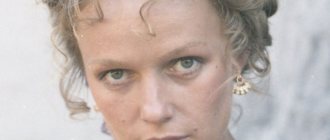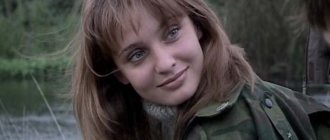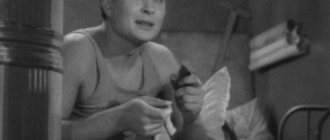Childhood and youth
Maximilian Schell was born in Vienna on December 8, 1930, the youngest of four children in the family. The boy's parents belonged to the creative intelligentsia and came from different countries, so Maximilian has a mixed nationality. Father Hermann Ferdinand Schell, a native of Switzerland, is known as a writer, poet and playwright. Margarete Noe von Nordberg's mother was an Austrian actress.
Actor Maximilian Schell
Subsequently, all the children of the Shell family - Maria, Karl, Immi and Maximilian - chose the acting path for themselves.
Maximilian's father did not want his children to engage in acting - he was afraid that such a life would not bring happiness. But his mother’s theatrical work largely predetermined Schell’s choice. He remembered how Margarete prepared for performances, and at the age of 3 he himself appeared on the stage of the Viennese theater.
Maximilian Schell in his youth
In 1938, Nazi Germany annexed Austria, and the Schells moved with their entire family to Zurich, Switzerland, to escape Hitler.
As a child, Maximilian did not think about a theatrical career - as a boy he loved to read, studied piano and believed that he would become either an artist, a musician, or a playwright. Impressed by his father's work, Schell wrote his first play at the age of 9.
Maximilian Schell with an Oscar
After finishing school, Maximilian studied for a year at the University of Zurich, where he played football and was a member of the university rowing team. At the same time, he worked part-time as a freelance journalist. After the end of the war, he moved to Germany, where he studied philosophy and art history at the University of Munich.
Then the young man returned to Zurich, served for a year in the Swiss army, studied again at the University of Zurich for another year and at the University of Basel for six months. After this, Maximilian got bored with his studies - he decided that scientific accuracy could only hinder a creative person. At the same time, Schell realized that writing was not his calling, so he took up acting and began playing at the Basel Theater.
Russian love of Maria and Maximilian Schell
Today we will talk about famous actors: sister and brother Maria and Maximilian Schell. At least two generations of this family are “sick” of Russia. Herman Ferdinand, the father of our heroes, wrote the book “Suvorov’s Last Love.” There are these words: “Why does life begin only at the end? How death prowls through life! But I should be happy. Satisfied? Life beat me up, but in the end it gave me love. There's no happier ending! How nice it is that he’s Russian, and what a generalissimo! – responded to the love of a Western woman.”
Maximilian also turned to the theme of “Russian” love, but only the first one - he directed the film “First Love” based on Turgenev’s story. In addition, he had a chance to experience this love himself, since he married a Russian actress, Natalya Andreichenko. They met on the set of the film “Peter I” in Suzdal. Andreichenko at that time was still married to composer Maxim Dunaevsky. Schell, then already famous, having received an Oscar for playing the leading role in the film “The Nuremberg Trials,” had broken many women’s hearts before this meeting, although he had not proposed marriage to any of his lovers. Their love story is touching and romantic. After one of the shooting days, Maximilian invited Natalia to have dinner together. “Imagine, having dinner with a foreigner at that time! But it was impossible,” Andreichenko recalled. “That’s what I explained: without an interpreter, our dinner is impossible.” But since we didn’t find a translator, we went together. I don’t speak a word of English, he doesn’t speak Russian. On a restaurant napkin, he drew me everything he felt: the moon, a heart and the bridge where we had our first date.” After this, the actress was summoned to the Lubyanka and demanded to end all relations with Shell. But perestroika came, and the actors got married. Their marriage was not cloudless. Andreichenko spent most of her time in Moscow with her son from her first marriage, and Schell and their common daughter Nastya lived in Los Angeles or in Tauplitz-Alm, a resort town in the Austrian federal state of Styria. However, when a few years ago Schell had an attack of pancreatitis and spent almost a month in the hospital, Andreichenko was constantly by his side the entire time. And only when the danger had passed did she leave Austria again for Russia. Currently, their sixteen-year-old daughter lives in Hollywood, while her mother stays in Moscow for a long time, participating in television shows, playing in theater plays and starring in Russian films. The father prefers Austria, where he spends time with the owner of one of the Viennese art galleries, Elisabeth Mihich. But Natalya Andreichenko is not upset about this - she believes that Maximilian has every right to enjoy life. Many newspapers wrote that they were divorced, but we will not confirm this, since we did not see the divorce certificate. Rumor has it that Maximilian's sister, Maria Schell, also a film actress, did not like Natalya Andreichenko. The same famous one who played Lucano Visconti’s film “White Nights,” based on one of F. M. Dostoevsky’s early stories, the main character, the Russian girl Natalia, an unearthly creature that is rarely seen in our time. And also Grushenka in The Brothers Karamazov. I wonder if the films mentioned above, where she played Russian women, influenced the life of the actress? Maria Shell, by the way, also experienced “Russian” love, which almost ended tragically for her - she tried to commit suicide (poison herself) because of her love for the composer Rodion Shchedrin. Maya Plisetskaya, his legal wife, in her memoirs mentions the dachshund Bati, noting in parentheses: “a gift from Maria Shell.” Rumor has it that the house in Munich, where Shchedrin and Plisetskaya now live, was also bought and given to her beloved by the Austrian actress. Maria Schell was born in Vienna on January 15, 1926, and her brother Maximilian was born there on December 8, 1930. Their father, Ferdinand Schell, whom we mentioned at the beginning of the article, was a Swiss poet and playwright, and their mother, Margarete Noe, was an Austrian actress. Maria performed on stages in Zurich, Vienna and Berlin, and made her film debut in Switzerland in 1942 in the film “Collapse” (“Stein-bruch”). After the war, she starred in various European countries in romantic and psychological dramas. In 1953, she played a nurse in H. Keutner’s film “The Last Bridge” (“Die letzte Brücke”, Cannes Film Festival Award-54). The heyday of her cinematic career occurred in the second half of the 50s, when she starred in complex psychological roles of young women experiencing an internal crisis - nervous, vulnerable and courageous for all their fragility. The outward unsightliness and even hysteria of Maria Schell’s heroines was redeemed by the beauty of the soul and the strength of spirit characteristic of most of her characters, for example, Paulina in the film “Rats” (“Die Ratten”, 1955); Rose in the film “Rose Berndt” (“The Sins Of Rose Bernd/Rose Bernd”, 1956); Gervaise in the film adaptation of the same name by R. Clément (1956, Venice IFF prize); Nathalie in the film “White Nights” (“Le Notti Bianche”, 1957); Grushenka in the film novel “The Brothers Karamazov” (1957). As you can see, Maria Schell received two of the most important awards in the field of cinema - prizes for best female roles in Cannes and Venice. Subsequently, the actress somehow failed to fit into the changed cinema - she acted rarely and in small character roles, for example, in the films “The Devil by the Tail” (“Le Diable Par La Queue”, 1969) and “Journey of the Les Miserables” ( "Voyage Of The Damned", 1976). Maximilian Schell became not only an actor, like his mother and older sister, but also a director, producer and screenwriter. Dark, dark-haired, handsome and intelligent leading actor of international class never agreed to mediocre or simply doomed to popularity, but uninteresting roles. Instead, he participated in various risky and ambitious projects on both sides of the camera. Maximilian was educated at the Universities of Zurich and Munich, where he studied art history, philology, and jurisprudence. While still at school, I became interested in theater and played in amateur performances. He began his stage career in 1953 at the Basel Comedy Theater and played in theaters in Essen, Bonn, Munich, Berlin, London, New York, and Salzburg. He performed the role of Hamlet with great success in Hamburg. Subsequently he staged dramatic and opera performances in Germany, Austria and Switzerland. Schell made his film debut in 1955, playing in L. Benedek’s film “Children, Mothers and General” (“Kinder, Mätter und ein General”) a young German soldier who refused to fight and was shot for violating the oath. Soon he appeared in other German films about the Second World War: “The Twentieth of July” (ТDer 20. JuliУ, 1955); “The Girl from Flanders” (“Ein Mädchen aus Flandern”, 1956). Subsequently, wartime heroes became Shell's favorite characters; anti-Nazi and anti-militarist intonations prevailed in their interpretation. Schell's early works are “The Wedding of Dr. Danwitz” (“Die Ehe des Dr. Danwitz”, 1957); “The Last Shall Be First” (“Die Letzten werden die Ersten sein”, 1957) demonstrated the high performing culture of this actor with a striking appearance (a combination of masculine beauty and intelligence). In 1958, he was invited to film in Hollywood, where he made his debut, not without success, in E. Dmitryk’s film “The Young Lions” (1958) based on the novel by I. Shaw. His hero was the fanatical Nazi servant, Captain Hardenberg, a minor character, but noticeable even against the background of the play of M. Brando and M. Clift. Three years later, also in Hollywood, Schell appeared in the image of another hero of this era - lawyer Hans Rolfe, who acts as a defender of the Nazi leaders at the trial in Nuremberg in the film “Judgement at Nuremberg” (“Judgement at Nuremberg”, 1961, directed by S. Kremer ). Schell's acting skills were deservedly appreciated by the Oscar for Best Actor. In 1962, Maximilian Schell, in a catchy, somewhat theatrical manner, created the image of Franz von Gerlach, one of the central characters in the film by V. De Sica “The Condemned of Altona” based on the novel by J.-P. Sartre. In America, Schell also starred in television films, such as “Hamlet” (“Hamlet”, 1960) and adventure series (d’Artagnan in the television version of “The Three Musketeers” - “Three Musketeers”, 1960), and did not refuse to participate in melodramas (“Five Finger Exercise”, 1962), comedies (“Topcapi”, 1964), thrillers (“Return from the Ashes” , 1965, “The Deadly Affair” - “The Deadly Affair”, 1967). He looked convincing in the leading role of the biographical drama about Simon Bolivar (Simon Bolivar, 1968). In the 70s, his strong suit was films and roles with anti-Nazi content (“The Man in the Glass Booth”, 1975, “The Odessa File”, 1974), although neither these films themselves, nor the roles played by Schell in them, can be compared with the films of the 60s. Having rightfully entered the world acting elite, Schell invariably received invitations to star in major Hollywood (“Julia” - “Julia”, 1977) and co-production projects, especially in films about the Second World War (“One Bridge Further” - “A Bridge Too Far", 1977, "Iron Cross" - "Cross of Iron", 1977). However, by this time, the main application of his strengths and abilities was directing and producing. The first experience of independently implementing a film project (producing the film “The Castle”, based on F. Kafka) took place back in 1968. Shell made his debut as a film director in 1971 with the film adaptation of I. S. Turgenev’s story “First Love”. Schell's next directorial effort, which he also wrote, produced and starred in, The Pedestrian (1973), was nominated for an Oscar for Best Foreign Film. His latest production was the family melodrama for American television “Candles in the Dark” (1993). Schell starred a lot in the 80s and 90s, played Peter I in the American television project “Peter the Great” (1986), and unexpectedly appeared as Lenin in the television series “Stalin”, 1992). In Hollywood, Schell moved to supporting roles (“Little Odessa”, 1994; “Deep Impact”, 1998); “Vampires” - “Vampires”, 1998), but in Germany he played the main characters (“On the Wings of Love” - “Wer liebt, dem wachsen Flügel”, 1999). In 1984, Schell made the wonderful documentary “Marlene” about the legendary Marlene Dietrich, with whom he starred in “The Nuremberg Trials.” He was the first to introduce the concept of a documentary drama, and this film created a sensation - it received a Golden Globe and was nominated for an Oscar. Later, Schell made the same semi-documentary film about his famous sister - every frame of it breathes warmth and love for the great Mary. The seventy-five-year-old actress answered the most important questions about her life, which, by the way, Natalya Andreichenko asked her. Kirill Pogodin
Movies
The actor’s film debut was the anti-war film “Children, Mother and General,” where Schell played the role of a German officer during World War II who deserted from the battlefield. This film for a long time determined the profile of Maximilian’s acting, who later starred in many more military-themed films, including “Young Lions.” In this film, Shell first appeared on the Hollywood screen.
Maximilian Schell in the film "The Young Lions"
In 1960, the man returned to Germany, where he played Hamlet in a teleplay based on Shakespeare's play of the same name. His performance as the Prince of Denmark is considered one of the best, on par with the work of Laurence Olivier.
In 1961, Maximilian was invited to play the role of a lawyer in the legal drama “The Nuremberg Trials” about the trial of Nazi criminals, which became key in his biography. Critics were delighted with the way the actor portrayed a man trying to blame anyone other than his clients for the Holocaust. For this role he received both an Oscar and a Golden Globe. According to the actor's biographer, during preparation Schell re-read a huge number of available documents from the Nuremberg trials.
Maximilian Schell in the film The Diary of Anne Frank
Later, Maximilian’s filmography included such films about the war as “Little Odessa”, “The Iron Cross” and “The Diary of Anne Frank”, in which Schell played not a German, but a Jew - Otto, the girl’s father. Then the artist turned to Jewish roles several times: in 1989, in the film “The Rose Garden,” he played the role of Aaron, a former prisoner of Auschwitz, and in 1997, he played the father of a Jewish family in the drama “Left Luggage.”
The most complex role on the theme of fascism and the Holocaust was Arthur Goldman from “The Man in the Glass Booth.” Maximilian is forced to transform himself into a Jew who is so offended by his people's submission in the face of brutality that after the war, his insane behavior leads him to be suspected not of a Holocaust victim but of a Nazi criminal in hiding.
Maximilian Schell in the film "The Man in the Glass Booth"
In order not to become an actor of one role and not to get “stuck” in a military theme, Schell played various characters, showing all facets of skill. He has played the roles of Vladimir Lenin, Peter the Great, the Egyptian Pharaoh and many other characters that are not similar to each other. In 1981, Maximilian appeared in another adaptation of Gaston Leroux's The Phantom of the Opera, where he played the Phantom himself. The interpretation of the plot is far from classical, but Schell’s character turned out to be as close as possible to the book prototype.
Maximilian was also successful as a director: the film “The Pedestrian” received a Golden Globe in 1974 and was nominated for an Oscar as best foreign film.
Maximilian Schell in the film "Peter the Great"
As a documentarian, Schell worked on the creation of Marlene, a documentary film about Marlene Dietrich. The movie turned out to be problematic, although it deserved an Oscar nomination: Dietrich initially agreed to filming, but then changed her mind and forbade the use of already filmed material in the film.
Maximilian’s most personal, intimate work was the film “My Sister Maria” about Maria Schell, the actor’s sister. For this film, the brother and sister received the German television award “Bambi”.
Maximilian Schell's last role in the film "The Robbers"
Schell continued to act until the end of his life in both European and Hollywood films. The last film with the actor’s participation, the crime drama “The Robbers,” was released after Maximilian’s death, in 2015.
Biography and personal life of Natalia Andreichenko
The actress was born in 1956 in Moscow. Despite the fact that she wanted to act in films since childhood, she entered the theater institute only the second time. After school, the girl applied to Sliver, but did not pass the exams, and a year later she entered VGIK. Immediately after university she began acting in films. For eight years she played passing roles in the films “From Dawn to Dawn”, “Our Debts”; her other films of her early years are little known. Natalya’s first success came after the film “Sibiriyada”.
Despite Andreichenko’s most popular role – Mary Poppins, critics consider her best work to be the heroine of a difficult military drama, which the actress played in the film “War Romance”. Already in the 2000s, the actress played in modern cinema, and what viewers remembered most was the comedy film “Give Me Moonlight.”
The biography and personal life of Natalya Andreichenko are very successful, but there were also spots on the biography. According to sources, there was one problem that Natalya Andreichenko suffered from - drunkenness. Photos of the star while drunk were even published online several times. Today, the actress has overcome this bad habit; she is a raw foodist, does yoga, and often meditates.
Personal life
In his youth, Maximilian was fond of the piano and, as he grew up, retained his love for music. The famous conductor Leonard Bernstein argued that Schell was an excellent pianist. The man gave concerts with Viennese and Berlin orchestras and participated in opera productions.
Maximilian Schell and Soraya Isfandiyari-Bakhtiari
The artist’s personal life was not as harmonious as his career. In the 1960s, the press enthusiastically discussed Maximilian's affair with Soraya Esfandiari Bakhtiari, who had previously been married to the last Shah of Iran. After Schell's separation from the ex-queen, there were rumors about the man's relationship with black supermodel Donyel Luna.
Maximilian Schell and Natalia Andreichenko
In 1985, on the set of the TV series Peter the Great, Schell met Soviet actress Natalya Andreichenko, whom he married in 1986. In this marriage, a daughter, Nastasya, was born, and Maximilian also adopted Dmitry, Natalya’s child from her first marriage. There are many photos of Shell with both children on the Internet. The actor also has a goddaughter, the famous Hollywood actress Angelina Jolie.
Maximilian Schell and Elisabeth Mihic
In 2002, the couple separated to officially divorce in 2005; After the divorce, Nastasya chose to stay with her father. The initiator of the divorce was Maximilian, who met Elisabeth Mihich, a gallery owner from Vienna 47 years younger than him.
Maximilian Schell and Iva Mihanovich
After the end of this novel, in 2008, Schell became involved with opera singer Iva Mihanovich, who became his last love. On August 20, 2013, the couple officially registered their relationship.
After the death of Maximilian Schell, relatives could not divide the inheritance for a long time: both the actor’s daughter and his wives and nephews laid claim to it.
Personal life of Margaret Qualley
Margaret is so absorbed in work that she blames her lack of personal life on her late development and, therefore, reluctance to start a serious relationship. Moreover, she had already made one attempt, dating for several years with Nat Wolff, an actor and musician who starred with her in Death Note.
Margaret Qualley and Nat Wolff
Qualley lives with her sister Rainey in Los Angeles, and when asked by journalists whether she is a lesbian, she simply answers - no, she is not. It’s just that for this period of time, work is a priority for her. And in rare hours of rest, he prefers dancing to meeting young people and starting relationships. The girl is a pacifist, feminist and vegetarian.
Death
At the end of his life, Schell suffered from back pain. On January 18, 2014, during filming, he fell while in one of the hotels in Kitzbühel. After hospitalization, the actor was diagnosed with pneumonia, but was told that Maximilian would recover within 10 days.
Maximilian Schell's grave
However, on January 30, the actor was admitted to an Innsbruck hospital, where he underwent surgery due to back pain. The surgery was successful, but the actor never woke up. Maximilian Schell died on February 1, 2014. The cause of death is believed to have been complications from anesthesia.
Natalia Andreichenko's husband is Maximilian Schell
Natalya met her second husband when she was still married. Natalya Andreichenko’s husband, Maximilian Schell, came to Russia in 1984 and saw the young actress at one of the auditions. They could not talk to each other without an interpreter, but this did not stop the young people from feeling a kindred spirit.
Natalya’s husband did not agree to the divorce for a long time; with the help of influential friends from special services, he tried to put pressure on Andreichenko. But she still managed to get a stamp in her passport. After that, she and her son and Maximilian left for America, where she lived with her husband for many happy years.
Filmography
- 1955 — “Children, mother and general”
- 1958 — “Young Lions”
- 1961 - “Nuremberg Trials”
- 1969 — “Simon Bolivar”
- 1973 — “Pedestrian”
- 1975 — “The Man in the Glass Booth”
- 1980 — “The Diary of Anne Frank”
- 1983 — “The Phantom of the Opera”
- 1985 — “Peter the Great”
- 1994 — “Little Odessa”
- 1997 — “Left Baggage”
- 1998 — “Deep Impact”
- 2001 — “Song of the Lark”
- 2006 — “House of Sleeping Beauties”
- 2015 — “Robbers”










